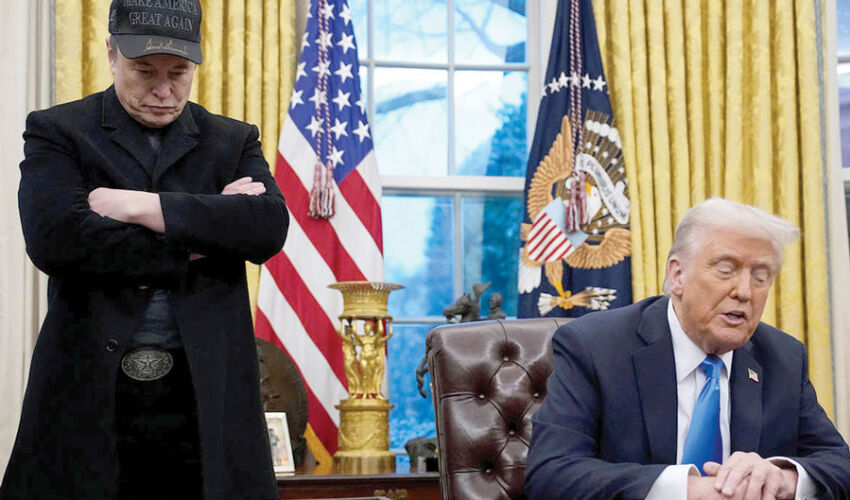
Musk’s comments provoked an escalating exchange of threats and recriminations between him and Trump. But then Musk decided enough was enough. By deleting several inflammatory posts and apologizing, he learned from his own bitter experience exactly what happens when a private empire clashes with the state.
The asymmetry is striking: a country with its own currency cannot go bankrupt like a corporation, yet it can, through fiscal, regulatory and legal force, drive private enterprises into bankruptcy. This was appreciated by investors, showing how quickly political risks can shake markets. With Musk and Trump’s spat making headline news, Tesla shares plummeted 14% in a single day, wiping out $150 billion in market capitalization.
But it wasn’t just that the tech tycoon erased a few emotional tweets. Musk’s first big mistake was his perception of the U.S. Treasury Department as the corporation’s finance department. His assertions that America will go bankrupt because of its growing deficit of around $2-2.5 trillion relies on the balance sheet logic he applies to a sovereign country issuing currency. This is a categorization error. In business, excessive debt can indeed lead to bankruptcy. But the U.S. government can’t run out of dollars. It can always print the money it owes, which is not the case for companies, households, or even the richest person in the world.
And so the main risk is not government bankruptcy, but inflation. When deficit spending begins to outpace the economy’s productive capacity, it can lead to higher prices, lower purchasing power and higher interest rates, which increases the cost of borrowing. Inflation usually causes investor anxiety and a rise in government bond yields, pushing down the currency. These are all serious economic costs, but they don’t rise to the level of bankruptcy. The U.S. cannot be forced to default on dollar-denominated debt.
Eurozone countries are in a different position because they do not control the currency they use. The euro is issued by the European Central Bank, so countries like Greece, Italy and Spain cannot print currency to service their debts. If their revenues fall or their borrowing costs rise, they cannot print euros to close the gap. Their ability to pay their debt depends entirely on the decisions of a central authority over which they have no control. Eurozone governments can suffer the same solvency crisis as businesses, while countries like the US and Japan cannot.
At the same time, the government can inflict murderous damage on private companies by canceling contracts and subsidies, tightening regulation, or launching investigations. Such leverage a private adversary has nothing to counter. Musk’s apology accounts for this asymmetry. His businesses – Tesla, SpaceX/Starlink, Neuralink – rely heavily on government contracts, subsidies, and regulatory approvals. By suspending these forms of support, Trump could cause Musk tens of billions of dollars in losses. And Musk, a private tycoon, has no retaliatory mechanisms to bankrupt the U.S. Treasury.
Yes, some government agencies have become dependent on Musk’s companies. SpaceX’s Dragon spacecraft has now become NASA’s only operational means of transportation for U.S. crews. Without it, NASA would have to revert to using Russian Soyuz capsules to get to the International Space Station. Nevertheless, the U.S. government could suspend support for Musk’s companies, tighten oversight of them, and launch onerous official investigations.
Musk underestimated how much his business depends on government support. Notably, his apology came after Trump threatened “very serious consequences” in response to Musk’s threat to cut off financial support for Republicans. His public retreat shows that money can buy access but does not protect against the tools of the state, to which nothing compares.
Misapplying corporate logic to public finances does more than just mislead the public. It can trigger a political and regulatory backlash against a structure that is far more resilient than any private enterprise. In the current political climate, even economic titans like Amazon founder Jeff Bezos, who owns the Washington Post newspaper, have adjusted their stance to avoid incurring the wrath of the Trump administration. When business interests depend on the favor of the federal government, any dissent can be dangerous.
Last year, Musk’s money helped Trump’s campaign, and today Trump is threatening Musk’s empire with his political power. At the very least, the visual demonstration that the U.S. Treasury is not Tesla is contributing to an informed public debate about fiscal policy. When people confuse government debt with corporate debt, they demand the wrong measures, which ultimately weakens the state and destabilizes the private sector that depends on it.
Carla Norrlöf,
Professor of Political Science at the University of Toronto and Visiting Senior Fellow at the Atlantic Council.
© Project Syndicate, 2025.
www.project-syndicate.org











